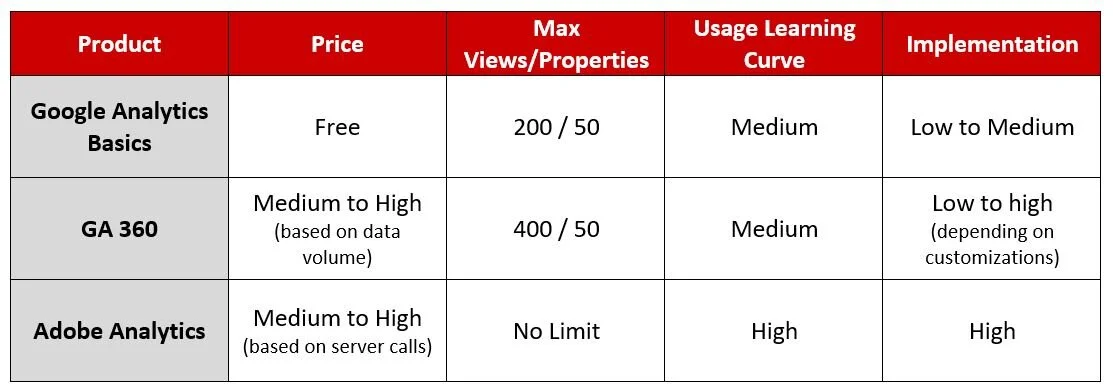The mission of Campfire Analytics is to build sustainable analytics solutions for companies large and small, and an important part of this is choosing the right tools. We strongly think that clients should make the most of the tools they currently have, and if they do need to expand their capabilities, we aim to help them choose the best tools for the situation objectively, rather than reselling any particular product.
A common choice when it comes to tools is which platform is best for web analytics, and specifically, choosing between Google Analytics and Adobe Analytics. Campfire has engaged with many clients on both of these solutions, and know full well how they can both be leveraged for maximum insight and efficiency.
If you’re looking to expand your web analytics capabilities, whether from a marketing or e-commerce standpoint, here are some pros and cons of each platform that may be worth considering.
Google Analytics (Basics)
Google Analytics, specifically the Basics tier, is the only product with the distinct advantage of being free. This makes it the go-to choice for many small-to-medium businesses, and even small enterprises. Of course, it does come with tradeoffs: Basics is the least flexible when it comes to querying and other capabilities, as well as limiting the user to 20 dimensions and 200 Views per property. Unlike with GA360 and Adobe Analytics, Basics makes no guarantees when it comes to data latency, and data is sampled above 500,000 sessions per property for ad hoc queries. In the past, Campfire Analytics has been able to help clients get around these sampling limitations on a free account by setting up a data extraction routine utilizing the API. While there are some obvious limitations to GA Basics, it’s hard to beat free.
GA 360 (Google Analytics Premium)
GA 360, the Premium version of Google Analytics, is more suited for Enterprise-sized companies, as it provides robust integration with other Google tools such as Google Ads, AdSense, Display & Video 360, Surveys 360, and Optimize 360 (among others). As with GA Basics, GA360 has several pre-built attribution models. While the price tag may be high for some clients (although certainly in line with other enterprise options such as Adobe Analytics), the easy-to-use API, guaranteed data latency of 4 hours, and hit-level data access makes this an extremely useful tool all the way from implementation to ad-hoc reporting.
Adobe Analytics (3 tiers)
Adobe Analytics has several tiers, currently called Select, Prime, and Ultimate. All are primarily aimed for Enterprise-sized companies, and have the advantage of being highly flexible and customizable on the dashboard and ad-hoc levels. It should be noted that Adobe Analytics largely isn’t for beginners. While there are pre-baked views for beginners, Adobe has much more robust in-platform querying capabilities via Workspace and Discovery, and therefore the learning curve is relatively higher. Additionally, there is a moderately high level of difficulty with regards to implementation, although it should be noted that implementation of Google Analytics can be comparable depending on the site and other variables. For these reasons, there can be a longer onboarding period when it comes to Adobe Analytics. However, Adobe Analytics has no limits on properties and views, many pre-built attribution models (including the ability to build a custom model), and data latency of just 2 hours. Combine this with no data sampling and plenty of data connectors, and Adobe Analytics might just be the powerful web analytics tool you’re looking for.
In summary
Maybe you’re an Enterprise-level e-commerce firm looking for better reporting customization, or perhaps you’re a local company who wants to understand whether your marketing efforts are paying off but just don’t know where to start. We would be glad to help you design your web analytics solutions so you can better understand and use your data to drive business decisions.
Send us an email and get in contact if you’d like to know more about how Campfire Analytics can help you reach your business goals.


